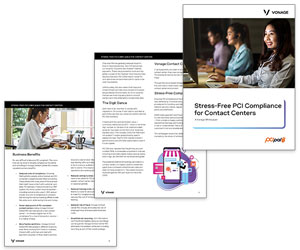Quick Overview
Security and compliance. Two words that go hand in hand for contact centres, where failures or vulnerabilities can have massive costs, contact centres need to be aware of the top risks including:
- Fraud
- Compliance
- Protecting Customer Data in a Remote Work Environment
This article outlines the top security challenges faced by contact centres and how to mitigate the risks.
Security Challenges to be Aware Of
We asked our panel of experts for the top call centre security challenges and what can be done to fix them.
Here are eight contact centre security challenges and ways to address them:
1. Fraud

Fraud often occurs in the contact centre, so it’s essential to be prepared to recognize and combat these situations before they cause irreversible damage.
Unfortunately, scammers are becoming even smarter in their methods – manipulating not only contact centre agents, but also automated systems too, which could be detrimental to data security.
This is why organizations need to be one step ahead and spot fraud in real time. Some are using technology such as conversation intelligence, allowing them to analyse previous fraudulent call examples to identify patterns, customize a fraudulent scorecard to understand the fraud probability of any given interaction, and leverage real-time insights to provide guidance to agents during a conversation if it’s flagged as suspicious.
By recognizing and understanding key indicators of fraud and malicious callers, contact centres can take back control on customer security, singling out threats efficiently while continuing to deliver a great customer experience.
Contributed by: Frank Sherlock at CallMiner
2. Compliance

There are a multitude of security challenges that contact centres face. A key one is compliance – call centres must comply with a range of regulations, such as PCI-DSS and GDPR, which are in place to protect customer data.
Compliance violations can result in fines and reputational damage to the call centre. To prevent compliance violations, call centres should implement compliance frameworks, such as ISO 27001, and regularly review and update policies and procedures.
Another challenge can be data breaches. These occur when sensitive information is compromised, either through cyberattacks or insiders.
These can be reduced or prevented by implementing stringent security measures, like two-factor authentication, data encryption and regular security audits.
On top of this, staff should receive regular training on data protection. Data access should also be restricted to only required staff.
Call centres require a multifaceted approach to security, with a focus on data protection, staff training, physical security, and compliance management.
By implementing robust security measures, call centres can protect customer data, minimize security risks, and comply with industry regulations.
Contributed by: Drew Naylor at MaxContact.
3. Protecting Customer Data in a Remote Work Environment

As more agents work remotely, the risks of data breaches, unauthorized access, and human error increase.
To ensure the integrity of their business operations and customer data, contact centres must adopt a multi-layered security strategy:
Secure Access to Company Networks
Implement Virtual Private Networks to provide a secure, encrypted connection between remote devices and internal resources.
Strong Authentication Measures
Strengthen access control by implementing multi-factor authentication, which requires employees to present at least two forms of identification (password, physical token, biometric data) to access sensitive data.
Employee Education
Train staff on best practices for handling sensitive information and avoiding social engineering attacks. Regular training sessions, simulated phishing attacks, and monitoring for policy violations are key to fostering a security-aware workforce.
Regular Security Assessments
Conduct periodic audits and risk assessments to identify vulnerabilities in your contact centre infrastructure. Promptly address them to maintain a robust security practice.
Contributed by: John Wang at Assembled
4. Data Breaches
These happen when employees, typically agents, inadvertently reveal sensitive information or when call centre systems are hacked.
Most call centres already have solid systems and processes for verifying customer identity, but these need to be applied across all the contact channels that you support.
You should implement strong security measures such as firewalls, anti-virus software, anti-malware software and encryption. Home workers should only access call centre systems via a VPN.
Sensitive information such as the personal details of customers or financial data should be available only on a need-to-know basis. ISO27001 is the gold standard for information security, but earning ISO27001 certification is not a trivial exercise.
Even if you don’t apply for it, completing a self-assessment questionnaire will help you find where your organization is vulnerable to data breaches.
5. Insider Security Threats

These threats arise when employees with access to sensitive data deliberately misuse it, e.g. to steal the identity of customers.
Thankfully, this is quite rare, but such misuse of data can be very damaging, not just financially, but to the reputation of your organization.
Employees with a grudge against the company and those with money troubles are most likely to steal confidential data. It’s therefore vital to perform thorough background checks as part of the selection process.
You should also conduct regular audits and team leaders should be on the lookout for warning signs when conducting appraisals.
Most insider security breaches are committed by employees who are in the process of leaving the company, so it’s worth considering removing access rights and putting employees on ‘gardening leave’ as soon as they resign or are dismissed.
Contributed by: Chris Dealy at injixo
6. The Remote Work Environment
One security challenge contact centres are now facing is that remote agents are becoming more vulnerable to cyberattacks.
They may be tempted to use personal devices for work-related tasks or connect to unprotected public-wifi while travelling.
These risky behaviours and easy mistakes could be detrimental to your call centre security.
Here are a few tips to help reduce the risk:
- Ensure agents take mandatory security training. Security is everyone’s problem, not just IT’s. Whether it is downloading the wrong software or clicking on a phishing link, people need to understand and be aware of common security vulnerabilities.
- Ensure agents are only using company-provided devices as IT can lose the ability to monitor employee activities. Typically, IT specialists can see what files employees are downloading or if they are visiting malicious websites.
- Ensure agents avoid public Wi-Fi and create strong password credentials at home. Routers that are not password protected are prime targets for hackers.
In the new era of remote work, protecting your customers’ data has never been more crucial. One simple mistake in the contact centre can jeopardize your customers’ trust and even put your company’s future in danger.
Contributed by: Five9
7. Unsecured Home and Public Networks
Hybrid working offers many benefits such as flexibility and autonomy for contact centre workers, but it also poses a cybersecurity threat.
Unsecured home and public networks and using personal devices for work can increase the risk of cyberattacks and jeopardize data security.
Professional headsets with an ultra-secure wireless connection and the highest DECT security enable workers to communicate securely from any location.
Personal video cameras provide extra protection for secure hybrid working with a firmware update. Users can blur or replace their video background with a solid colour.
These background effects are processed and applied directly on the device using integrated Edge AI processing, ensuring that a user’s surroundings and sensitive data that may appear in the background of their original video image remain fully secure and completely private – never leaving the device.
8. Eavesdropping and Overhearing Conversations

In busy, noisy contact centre environments there is a constant need to safeguard customer discussions that can often involve sensitive information.
Professional headsets designed specifically with security in mind can reduce the risk of eavesdropping and the data breaches this causes.
Headsets with noise-cancelling technology that remove background sounds give peace of mind that conversations aren’t being overheard and customer/agent information remains confidential.
Voice-enhancing microphones also keep voices crystal clear for more focused conversations with high-quality sound.
Professional headsets designed for ultimate security and quality give contact centre staff the ability to work productively and securely from anywhere.
With the safest professional wireless headsets on the market, the connection between the wireless adapter and the headset is certified to the highest DECT Security – Level C – making it ultra-secure. It also has FIPS military-grade 256-bit encryption algorithms to effectively prevent eavesdropping on conversations.
Contributed by: Nigel Dunn at Jabra
For more great insights and advice from the experts, read these articles next:
- Practical Tips to Connect With Customers
- How Technology Can Plug the Gap in a Short-Staffed Call Centre
- Top Call Centre Planning Challenges and How to Handle Them
- What are the Best Security Questions for Call Centres?
Author: Robyn Coppell
Reviewed by: Rachael Trickey
Published On: 24th Apr 2023 - Last modified: 1st Jul 2024
Read more about - Technology, Assembled, CallMiner, Chris Dealy, Compliance, Drew Naylor, Five9, Frank Sherlock, Jabra, MaxContact, Peopleware, Security








































